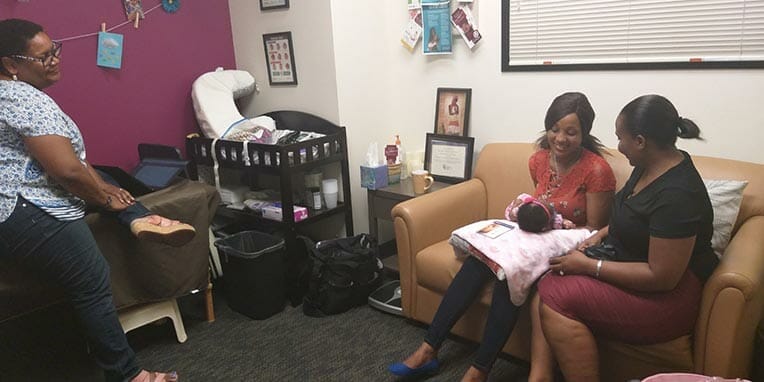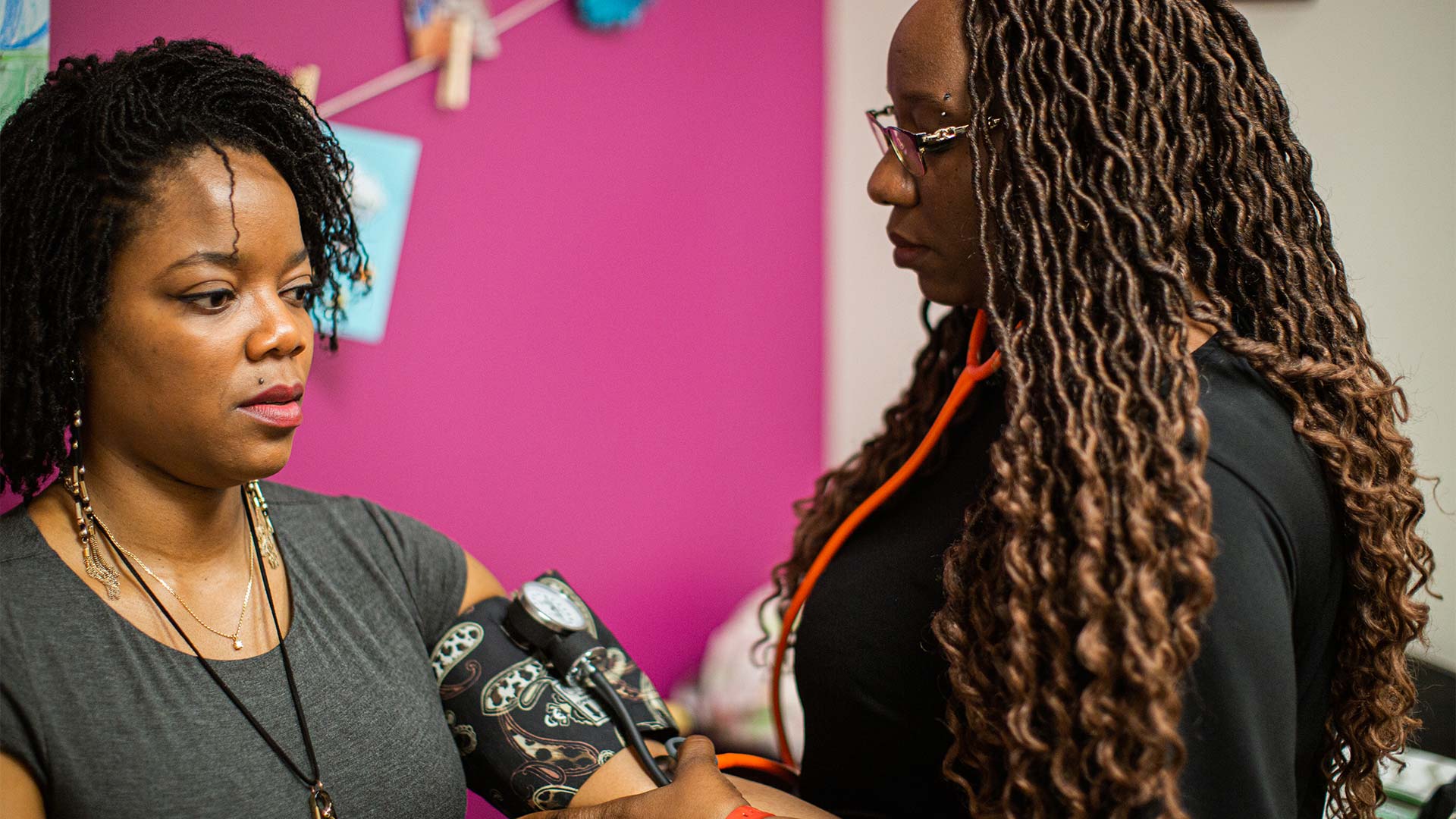Delivering Positive Birth Experiences to Black Women in San Diego
Story by Maureen Simpson
Photos by Lisa Bain & Sophia Ahmann
Darynée Blount had every intention of becoming a lawyer. But after traumatic birth experiences with her first two children, she decided to pursue justice in a different setting - America's health care system.
"The care I was getting and the treatment in the hospital, how that all played out, was abysmal for me," said Blount, who described being ignored as a first-time mom when she was 16. "I was young and Black, so they weren't trying to hear that I had a birth plan. They immediately assumed I was on state assistance, and I had to ask for support to breastfeed. Nobody was trying to help me."
When she had her second child, Blount chose to have a natural birth in the hospital again but still encountered mistreatment. She recalls how the doctor manually dilated her cervix without asking for permission and repeatedly dismissed her pain during labor and delivery.
"It felt like this fight and battle to be heard when a woman should be in the opposite mode of embracing and loving her new baby and family. It's a very vulnerable place to be in," Blount said. "But those birth experiences are exactly what led me to where I am today. I learned it was just a microcosm of what was happening on a national level for Black women."
In the United States, Black mothers are three to four times more likely to die from childbirth than non-Hispanic white women, regardless of education, income or access to prenatal care. Black families also are more likely to experience low birthweight, preterm birth and infant mortality.
Blount, who now works as a certified professional midwife and owner/director of Birth Roots Women's Health and Maternity Center, partnered with PCI in 2019 to help address these disparities. With support from the U.S. Department of Health and Human Services, PCI's Healthy Start program aims to bring high-quality perinatal support to Black women in San Diego, including Black immigrants. Services include in-home childbirth education, birth planning, breastfeeding support, infant care and parent education, family wellness checks, father/partner support and connections to midwifery and doula services. Language support is available in English, Spanish, Somali and Haitian Creole.

"This is not a social service. It is not a helping program. This is the high-quality standard of care that every woman deserves but only some women are getting," said Lisa Bain, Director of PCI's Healthy Start program. "There are a lot of doulas, midwives and breastfeeding counselors in San Diego, but the faces of those providers don't reflect the diversity of communities we have here. Darynée was someone we knew we really wanted to work with, and we have other partners as well who are helping us change the face of the perinatal health system in San Diego. We want to elevate and strengthen the capacity of each of these communities."
PCI's Healthy Start team includes six Perinatal Navigators, all of whom are women of color with ties to the local African American, Somali, Haitian, Hispanic and East African immigrant communities. Each has a background in public health or education and is certified or pursuing certification to become childbirth educators, lactation counselors, and birth and postpartum doulas.
"It was super important to us to have representatives of these populations and not just to insert ourselves in these communities," Blount said. "It changes your entire pregnancy and birth experience when you have people that you trust and know supporting you."
PCI's Healthy Start program also has partnered with For the Village, which provides free doula services to families from marginalized groups in San Diego County. Since June 2019, more than 40 doulas have been trained through the collaboration to provide emotional support and information before, during and after childbirth for expectant mothers enrolled in the Healthy Start program. The doulas accompany Blount on home visits and to key appointments with participants.
"It's hard for a pregnant woman who is already feeling a little bit vulnerable to then relate to a doctor who doesn't necessarily understand who they are or where they are coming from," Blount said. "I'm trying to give them a fighting chance by educating them going into the system as well as having a doula accompany them that will help advocate for them. And then following them after the birth to make sure … that they're getting the care they need if they are sick - the mom or the baby - and that things aren't ignored."

In 2019, more than 130 families were enrolled in PCI's Healthy Start program, which provides education, resources and other services up to 18 months after a baby's birth. Perinatal Navigators have recruited or received referrals to the program through word-of-mouth and strategic partnerships with the American Red Cross Women, Infants & Children (WIC) program, Birth Roots, For the Village, the Perinatal Care Network and others.
"We're trying to think outside the box and going to places where we think pregnant mothers would be, especially in the Black community," said Nyisha Green-Washington, who serves as both a Perinatal Navigator and Program Coordinator for Healthy Start. "We've visited beauty salons, grocery stores, barber shops and churches. We really want to be on the ground."
Meet a San Diego mom who sat down with KPBS to share how support from For the Village and PCI's Healthy Start program impacted her birth experience:

Rooting Out Human Trafficking in San Diego, One Student at a Time
Story by Maureen Simpson
Photos by Steven Adams and Tony Tseng

Bernadete Leal begins every Project ROOTS session in a darkened classroom with one question: "Where do you want to bring light?"
While the exercise is a small component of the after-school program, Leal said its power lies in teaching students they can be a force for positive or negative change in the world. And it's their choice to decide.
"What I see a lot with the girls here starts with self-esteem," said Leal, who has served as a Project ROOTS facilitator for three years and a teacher in San Diego for more than five. "They are 9 and 10 years old and already depressed and talking about suicide, violence at home, gangs and lack of self-respect. … [Project ROOTS] makes them feel so important and that they matter."
PCI implements Project ROOTS in partnership with the San Diego Unified School District, Boys and Girls Clubs and the San Diego District Attorney's Office. The purpose of the program is to address the root causes of gender-based violence, sexual exploitation and unhealthy relationships through group mentoring and social emotional learning. Girls and boys ages 8-13 learn how to be safe and resilient by exploring issues through the lenses of empathy, equality and empowerment.

"I believe that investing in early prevention and intervention can build a new generation with strong roots of humanity and dignity based in genuine respect for the different sexes, races and cultural backgrounds," said Summer Stephan, San Diego County District Attorney. "This program is a pathway to a healthier community with less domestic violence, sexual abuse and gang violence."
Project ROOTS facilitators, typically school teachers and counselors, educate groups of 15-20 kids about inclusivity, emotional freedom and mutual respect during their 60- to 90-minute group sessions. Topics include everything from Internet safety and communication to hygiene, health and human trafficking.
Leal said the group is also a place for participants to vent, bond and strengthen their voices in a supportive environment. Students who once frequented the principal's office for behavioral issues now informally serve as ambassadors of peace in the school.
"This program is so important - the transformation, the awareness, the education. We are spreading good," she said. "I am grateful for the opportunity, and I see the change."
Amanda Cutler is a counselor at Walker Elementary School and facilitated a boys' group for Project ROOTS in 2019. Although she was aware that human trafficking is a serious and pervasive issue in San Diego, she said this program is one of the first to address the problem with a focus on youth and primary prevention, which aims to prevent (or stop) violence and exploitation before it occurs.
"I think this is something that isn't taught at home. I think this is something that isn't taught in the classroom. It really is a specialty," Cutler said. "More kids need to learn about these skills. They need to learn about consent. They need to know about their own empowerment. I only had six boys, but I would have loved to work with everyone at my school. I think this is an amazing program."
Learn more about Project ROOTS through the lens of one of our facilitators:













